





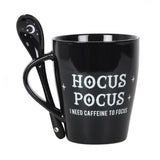
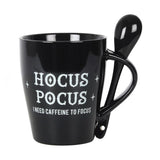
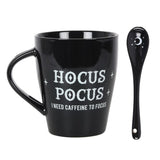
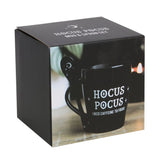
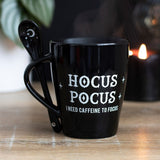
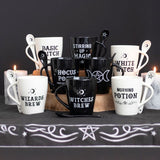
Hocus Pocus Mug and Spoon Set
Introducing the must-have accessory for any caffeine-loving witch or wizard - the Hocus Pocus Mug and Spoon Set! Featuring a sleek black ceramic mug adorned with a playful 'Hocus Pocus I Need Caffeine to Focus' design, this set is the perfect way to inject some magic into your morning routine.
The mug is generously sized, measuring H10cm x W12cm x D8.5cm, and comes with a matching spoon for stirring in your favorite brew. Plus, it's dishwasher and microwave safe, making it easy to use and clean.
Whether you're sipping on a hot cup of coffee or indulging in a soothing tea, this mug and spoon set is sure to add some charm and personality to your drinkware collection. It's a perfect gift for the caffeine lover in your life, or for anyone who wants to add some whimsy to their daily routine.
Packaged in a sleek box measuring H10.5cm x W11cm x D9cm, the Hocus Pocus Mug and Spoon Set is ready to be gifted or added to your personal collection. Get yours today and bring a little bit of magic to every cup
he phrase "hocus pocus" is often used as a magical incantation or spell in popular culture, but its origins trace back to a bit of linguistic and historical evolution.
-
Origins and Linguistic Evolution:
- The exact origin of "hocus pocus" is somewhat debated, but it is generally believed to have its roots in a mixture of languages and historical contexts:
- One theory suggests that "hocus pocus" may have originated from the Latin phrase "Hoc est corpus meum," which means "This is my body." This phrase is used in the Roman Catholic Eucharist during the consecration of the bread and wine into the body and blood of Christ. Over time, the phrase may have been corrupted and turned into "hocus pocus" as a mocking or derisive reference to the ritual.
- Another theory connects "hocus pocus" to the Dutch word "hokus-pokus," which was used in the 17th century to describe jugglers or conjurers who performed sleight-of-hand tricks and illusions. This term was likely brought to England by Dutch performers, contributing to the phrase's popularity.
- The exact origin of "hocus pocus" is somewhat debated, but it is generally believed to have its roots in a mixture of languages and historical contexts:
-
Meaning:
- Today, "hocus pocus" is primarily used as a colloquial expression to refer to magical or deceptive actions, tricks, or incantations, often in a playful or unserious context.
- It can be employed when someone wants to create an air of mystery or misdirection, such as when performing a magic trick or when using humorously exaggerated language to describe something that seems implausible.
In essence, "hocus pocus" doesn't have a fixed meaning; rather, it is used in different contexts to evoke a sense of magic, illusion, or trickery. It has become a popular phrase associated with magicians, conjurers, and the idea of things happening seemingly by magic.
